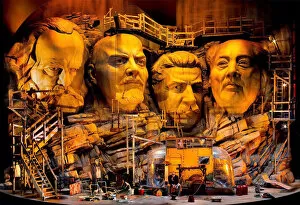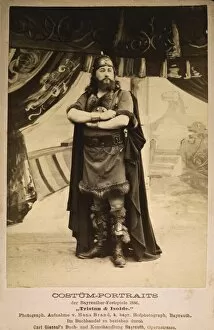Bayreuth Festival Collection
The Bayreuth Festival, founded in 1876 by composer Richard Wagner
All Professionally Made to Order for Quick Shipping
The Bayreuth Festival, founded in 1876 by composer Richard Wagner, is a celebration of his groundbreaking works and has become synonymous with the highest level of operatic excellence. The festival takes place in the Festspielhaus, a magnificent theater specifically designed to showcase Wagner's music dramas. One of the most iconic moments in Bayreuth Festival history was the first complete performance of Wagner's Ring Cycle in 1876. The opening scene of Das Rheingold featured the mesmerizing Rhinemaidens guarding their precious gold, as depicted in a line engraving from a German newspaper. This marked the beginning of an unforgettable journey through love, power, and destiny that captivated audiences for generations to come. Amalie Materna's portrayal of Brunnhilde in Der Ring des Nibelungen also left an indelible mark on Bayreuth Festival history. Her powerful interpretation brought this complex character to life and solidified her status as one of opera's greatest sopranos. The festival owes much of its success to talented conductors like Hans Richter and composers like Siegfried Wagner (Richard Wagner's son). Their contributions ensured that each performance at Bayreuth was conducted with precision and passion. Over the years, innovative stage designs have added another layer to the immersive experience at Bayreuth. From Frank Castorf's bold interpretation of Der Ring des Nibelungen in 2013 to Valhalla engulfed in flames during Twilight of the Gods' funeral procession scene (as seen on a captivating stage design from 1896), these visual elements have enhanced audience engagement and created lasting memories. Programs from past festivals provide glimpses into how this prestigious event has evolved over time. A program from 1899 showcases both traditional favorites and new productions that pushed boundaries while staying true to Wagnerian ideals. Bayreuth Festival has not only celebrated Richard Wagner but also introduced other masterpieces such as Tristan und Isolde and Parsifal.














